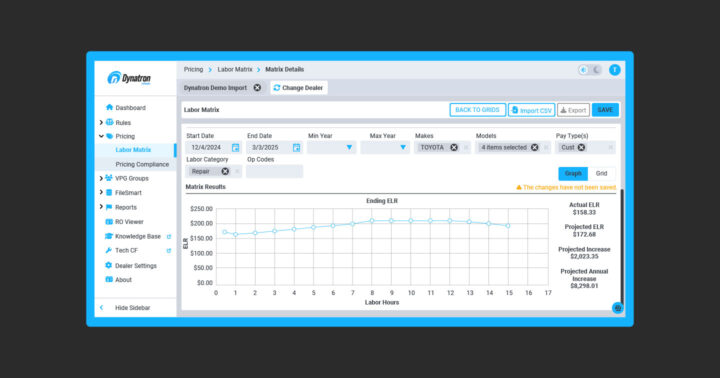The automotive industry is evolving rapidly, and dealerships are under increasing pressure to optimize operations while enhancing customer satisfaction. A dealer management system (DMS) is central to achieving this balance, particularly in Fixed Operations. Before we explore how a DMS serves as a game-changer in fixed operations, it’s crucial to understand its broader role and features. This article will guide you through what a dealer management system is, its functionalities, and its importance in shaping the future of dealership Fixed Operations.
What is a Dealer Management System?
A dealer management system (DMS) is a comprehensive software suite designed to manage dealership operations efficiently. It consolidates various functions within the dealership—inventory, sales, service, parts, and accounting, all into one interface.
The best dealer management system solutions go a step further by leveraging data analytics, offering insights that unlock profitability in sales and service operations. These systems streamline communication across different departments, eliminate manual inefficiencies, and provide a robust framework for data-driven decision-making.
This all-in-one approach makes the DMS a foundation for operational success, from optimizing service efficiency to managing customer relationships more effectively.

What Does a Dealer Management System Do?
The core purpose of a DMS is to simplify dealership operations. With the best dealer management software, you can automate mundane tasks, gain better visibility into metrics, and identify hidden revenue opportunities.
A modern DMS bridges multiple aspects of dealership management in ways that include:
- Inventory Tracking – Efficiently manage parts and vehicle inventory to ensure your stock aligns with demand.
- Service Appointments – Streamline scheduling to minimize downtime and improve customer satisfaction.
- Customer Relation Management (CRM) – Maintain comprehensive records of customer interactions and predict future purchases or service needs.
- Financial Management – Automate payroll, accounting, and financial reporting so your team can focus on growing profits.
By offering such diverse functionality under one roof, a DMS fosters collaboration across teams and ensures an agile response to industry challenges. Its role is indispensable to the operations of both small-scale and large automotive dealership networks.
What Software Do Most Dealerships Use?
Most dealerships rely on auto dealer management software tailored to their specific size and operational complexity. Commonly used platforms include solutions that incorporate cloud-based technologies, mobile capabilities, and real-time analytics.
When dealerships search for the best dealership management software, they typically prioritize:
- Ease of Integration – The software should work seamlessly with existing systems like CRM tools and accounting solutions.
- Customization Capabilities – No two dealerships are the same, so flexibility is key to handling unique challenges.
- Data-Driven Insights – High-performing software uses predictive analytics to identify trends and new revenue opportunities.
Auto dealerships now increasingly favor platforms that focus on fixed operations. Why? Because fixed operations—parts and service departments—often generate a large proportion of dealership profits, making specialized tools a necessity.
What is an Automotive Management System?
An automotive management system (AMS) expands on the concept of a DMS by focusing explicitly on the automotive industry’s unique demands. The best dealer management system reviews consistently highlight the impact of AMS tools by optimizing not just Fixed Operations, but the entire dealership life cycle.
Features often discussed in glowing reviews include:
- Workflow Automation – Automated workflows for everything from warranty processing to customer follow-ups.
- Telematics Integration – Capture real-time updates on vehicle health for proactive service recommendations.
- Advanced Reporting – Detailed reports for performance metrics, technician efficiency, and repair order (RO) profitability.
Innovations like these help dealerships run more effectively, while ensuring customers stay satisfied with faster turnaround times and more transparent operations.
What is the Future of Dealer Management Systems?
The future of DMS technology points toward deeper integration of AI and machine learning. These advances will enable hyper-personalized customer interactions and predictive maintenance alerts. SaaS-based platforms are another area to watch, as they offer direct scalability without the upfront costs of on-premises systems.
Another trend reshaping these systems is the focus on mobile-first technologies. Dealer teams want the freedom to access tools and data wherever they are—on the shop floor, at the parts counter, or in front of a customer.
Dynatron Software is paving the way, offering solutions that integrate with Dealer Management Systems and analyze Fixed Operations data comprehensively. Dynatron’s solutions, like PriceSmart, help dealerships identify gaps in pricing, unlocking revenue that would otherwise go unnoticed.
What are the Features of a Performance Management System?
A performance management system focuses on increasing team productivity through tangible metrics. With dealerships, these systems emphasize technician efficiency, compliance with pricing norms, and improvements in service advisor training.
The best used car dealer management system typically includes:
- Service Advisor Training – Technology-enabled programs that equip advisors with skills to maximize upselling and optimize service delivery.
- Technician Performance Metrics – Insights into tech time efficiency per repair order versus billed labor.
- Revenue Opportunity Analysis – Identification of pricing gaps, compliance issues, or inconsistent service practices.
With Dynatron’s PriceSmart solution, dealerships can better manage this performance cycle. PriceSmart optimizes pricing strategies with market insights, ensuring you remain competitive without leaving revenue on the table.
What Software Do Sales Departments Use?
Sales departments within dealerships rely on a dealer management system to track leads, manage communications, and convert prospects into paying customers. Ideally, the software should allow seamless data sharing between the sales, service, and finance departments.
Effective tools for sales include:
- CRM Components – Helping sales teams track customer interactions and follow up effectively.
- Leads Automation – Identifying high-value leads to prioritize outreach.
- Mobile Sales Apps – Enabling teams to close deals even when they’re away from their desks.
Integrating such tools aids sales teams not only in meeting their targets, but also in offering a better customer purchase experience.

What System Do Car Dealerships Use?
Car dealerships commonly implement either a standalone DMS or a comprehensive suite of tools tailored to their needs. The type of system in use often depends on their priorities—whether they are optimizing for sales, service, or both.
Dynatron Software’s Repair Order Insights (ROI) platform powers purpose-built Fixed Ops tools, delivering actionable data to boost profitability and performance:
- PriceSmart – Identifies pricing inefficiencies in labor and parts to maximize ELR and revenue.
- FileSmart – Helps you get the maximum warranty parts and labor increase with minimal manual effort.
- MarketSmart – Uses real-time data to drive personalized marketing campaigns that keep traffic flowing.
Turn Fixed Ops Into a Profit Powerhouse
Investing in a dealer management system for fixed operations is no longer optional—it’s imperative. The modern DMS not only simplifies workflows, but enables dealerships to identify hidden opportunities for growth and sustainability. From technician performance to pricing optimization, its capabilities drive measurable improvements across the board.
Dynatron Software’s PriceSmart solution demonstrates the tangible value of data-driven optimization, helping dealerships unlock $250K or more in additional annualized revenue within the first year. Dealers typically see 22x ROI in Year 1, followed by 16x in Year 2, 14x in Year 3, and 12x by Year 5. Now is the time to leverage this technology to outperform competitors, boost profitability, and meet evolving customer expectations head-on.
At Dynatron, our data-driven insights and expert coaching help you boost ELR, CP gross revenue, and customer satisfaction. Ready to make Fixed Ops more profitable? Schedule a demo or call 866-888-3962.